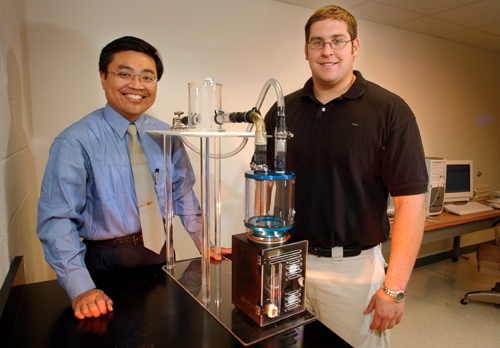Electrical and computer engineering major Christopher Royle ’03 (Stockton, N.J.) is engaging in a summer research project that could help minimize animal testing.
Ventricular assist devices, typically used as bridge-to-recovery devices for heart failure patients, often rely on animal testing to understand their interaction with the cardiovascular system. Royle is working to minimize such testing by building a mock circulatory system with a baroreceptor control mechanism, a neurological function of arterial pressure and heart rate regulation.
A participant in Lafayette’s EXCEL Scholars Program, Royle is working with Yih-Choung Yu, assistant professor of electrical and computer engineering. In EXCEL, students assist faculty with research while earning a stipend.
Yu received a $12,000 grant from the Lindback Foundation for the research. He began the project last semester when he and another student, Matthew Loh ’04, made a computer simulation of the project. A fluid circulation loop and other hardware are being set up this summer in preparation for building the mechanism this fall.
“I am putting together a loop to simulate the heart, more specifically the left ventricle, which pumps blood through the aorta, and the systemic side of the circulatory system, the arteries and veins that run from your heart to the rest of your body,” says Royle. “Once we have the loop constructed, we will be able to recreate various situations, such as different heart beats. We can then use this loop to design a compensator, which will control either the pressure or volume of fluid that we would like to move.”
Royle says that the loop is a physical fluid system made from tubing to model arteries and veins. It has a few other pieces, such as a piston in a chamber, compliance chambers that act as regulators to keep the pressure relatively constant in the loop, and a variable opening to act as resistance to the fluid’s flow.
“The cardiovascular mechanism, such as pressure and flow regulation, will be expressed in math functions and implemented in a microprocessor to mimic the blood pressure and volume waveforms of the cardiovascular system in the fluid loop,” says Yu. “The success of this project could improve testing procedures for heart assist devices and enhance cardiovascular physiology instruction.”
“Chris has a good capability in math and is interested in hands-on experiments,” says Yu. “He has the talent of using the same concepts to cross different disciplines. These make him a good candidate to work on this multidisciplinary project.”
This project is allowing Royle to use what he has learned in class in a new area he wouldn’t be able to focus on in coursework, he says. “A lot of similarities and parallels exist between a fluid system and an electrical system, so many of the concepts carry over,” explains Royle. “But I still had to read about and become comfortable with the correlation to the actual heart.”
The Control Systems course that Royle took with Yu this past semester prompted his interest in working with Yu over the summer.
“Towards the end of the course, he described the project that he would be working on and proposed what my contribution would entail,” says Royle. “This work is pretty close to what we learned in class, except I have the opportunity to start from scratch and see how all the parts come together.”
“Chris had the opportunity to design a controller to maintain a constant speed of a motor in the Control Systems course,” says Yu. “This project gives him an opportunity to see a real-world application of motor control in fluid systems and biomedical engineering. In addition, he is getting experience in instrumentation, data analysis, and microprocessor control.”
Royle says that Lafayette is a very good environment for this project. “With the college’s resources and Dr. Yu’s experience, the atmosphere is conducive to this type of research,” says Royle.
A graduate of Hunterdon Central Regional High School, Royle made Patriot League Honor Roll in the fall of 1999 and is a three-year letter winner in football. He made All-league in 2000 and 2001 and was named Pre-Season All-American in 2002 on The Sports Network and Lindy’s Sports. He also is an Eagle Scout.

Christopher Royle ’03 researched ventricular-assist devices, used to help heart-failure patients recover, as an EXCEL Scholar working with Yih-Choung Yu, assistant professor of electrical and computer engineering.
